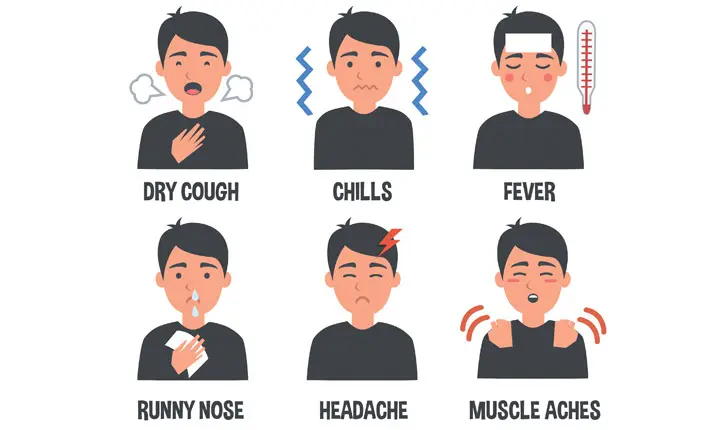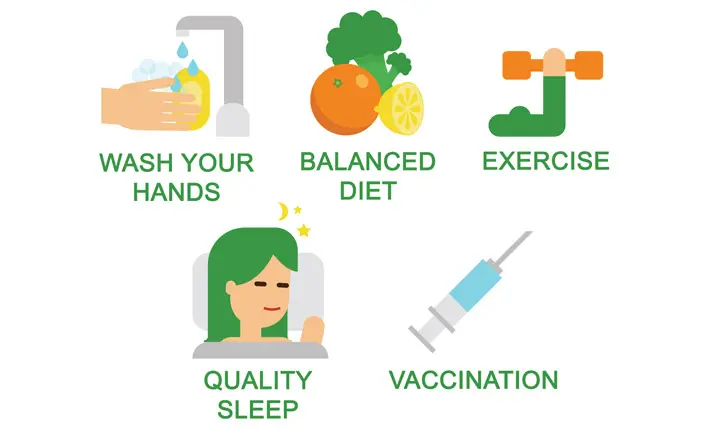-
-
Featured Care Areas


Source: Shutterstock
Flu Season: How to Avoid Catching the Flu
Last updated: Thursday, July 11, 2019 | 4 min reading time
Hearing that dreaded "cough cough" everywhere you go? Here's how to protect yourself this flu season.
It's that time of year again, and we're not talking about Christmas. This season of giving comes with a present you DO NOT want to receive–one which leaves you coughing, sneezing, and feeling completely miserable.
In Singapore, flu season tends to arrive during the cooler periods between May to July, and December to February. The highly-contagious virus can spread up to 6 feet away, and adults may even infect others a day before showing any symptoms–while still appearing completely healthy.
Here's what you need to know to protect yourself and stay healthy this flu season:
How do I know if I have the flu?
Symptoms of flu include the following:
- Cough
- Sore throat
- Fever
- Body aches
- Headaches
- Fatigue
- Runny or stuffy nose
- Vomiting and diarrhoea
While these are common indicators of the flu, you may or may not have all of the above symptoms.
For example, not everyone with the flu will have a fever (although you may feel feverish or have the chills), and vomiting and diarrhoea are less common in adults than children.
While the flu generally leaves you feeling uncomfortable and weak, it can also lead to serious complications. Consult your doctor whenever you are in doubt.
Is there a difference between the flu and a cold?
People often use the 2 terms interchangeably, so it's understandable if you think they're one and the same.
However, the flu and the common cold are actually caused by separate viruses, and it's important to tell them apart as they have rather different implications on your health.
Symptoms for both illnesses may seem similar, but those for the flu are generally more intense. While colds tend to only last a few days, and are characterised by a stuffy or runny nose. The flu often includes fever and body aches, and can leave you miserable for weeks.
Symptoms aside, a bad case of the flu can also lead to major health complications such as pneumonia, inflammation of the heart, and multi-organ failure.
The easiest way to tell what illness you have? Taking your temperature! Fevers often arrive at the beginning of a flu, while they're very rare for colds.
How do I protect myself from the flu bug?
Staying healthy during the flu season can be challenging, as the virus is notoriously contagious. That said, taking the following precautions greatly increases your chances of staying flu-free:
- Wash your hands for at least 20 seconds with antibacterial soap and water. Especially after visiting the bathroom, and before touching your eyes, nose, or mouth
- Use a serving spoon when sharing food
- Eat a balanced diet that includes at least two servings of fruits and vegetables daily
- Exercise regularly
- Get 7 hours of quality sleep per night
- Avoid smoking
- Ask your doctor for antiviral medicine if you have been exposed to someone with flu symptoms
You could also consider a flu vaccination if you spend a lot of time in a crowded office or in similar environments where the chance of infection may be high. A flu vaccination is able to reduce the chance of illness by up to 60%.
You may also want the vaccination if you are in close contact with those who are at risk of developing complications, namely:
- The elderly (aged 65 years and above)
- Children aged 5 years and below
- People with low immunity (eg. patients undergoing cancer treatment)
It takes 2 weeks for the vaccine to work, so you should get vaccinated before the flu season starts (ie. before May to July or before December to February), once every year.
It's easy to get vaccinated at any hospital or clinic for a fee–a small price to pay to stay healthy!
If I'm down with the flu, what should I do?
If you've got flu-like symptoms, take the following steps to recover quickly and prevent spreading the virus to others:
- Rest well and avoid strenuous activities like running until you've recovered completely
- Drink plenty of liquids
- Cover your mouth with a tissue when coughing
- Cover your nose with a tissue when sneezing
- Wear a surgical mask around others
- Don't go to school, work, or public spaces while ill
See a doctor immediately if you develop the following symptoms:
- Difficulty breathing
- Persistent discomfort or pressure in the chest or abdomen
- Persistent dizziness or confusion
- Seizures
- No urination
- Severe weakness or unsteadiness
- Severe muscle pain
- Fever or cough that refuses to improve
- Worsening of chronic medical conditions
Even if your symptoms are not severe, visiting a doctor is recommended to help you recover more quickly and alleviate discomfort. A doctor may prescribe antiviral medication to fight the virus, and painkillers to deal with symptoms like headaches and muscle pains.
Influenza. (2019, May 29) Retrieved on 14 Jun 2019 from https://www.healthhub.sg/a-z/diseases-and-conditions/103/topics_influenza%E2%80%8B
Nordqvist, Christian (2017, Dec 20) All you need to know about flu. Retrieved on 14 Jun 2019 from https://www.medicalnewstoday.com/articles/15107.php
How Flu Spreads. (2018, Aug 27) Retrieved on 16 Jun 2019 from https://www.cdc.gov/flu/about/disease/spread.htm
How Flu Spreads. (2018, Aug 27) Retrieved on 16 Jun 2019 from https://www.cdc.gov/flu/about/disease/spread.htm
Flu or Cold Symptoms? (n.d.) Retrieved on 15 Jun 2019 from https://www.webmd.com/cold-and-flu/flu-cold-symptoms#1
How much sleep do you need? (n.d.) Retrieved on 16 Jun 2019 from https://www.myactivesg.com/active-health/domains/sleep
Nordqvist, Christian (2017, Dec 20) All you need to know about flu. Retrieved on 14 Jun 2019 from https://www.medicalnewstoday.com/articles/15107.php
How Flu Spreads. (2018, Aug 27) Retrieved on 16 Jun 2019 from https://www.cdc.gov/flu/about/disease/spread.htm
How Flu Spreads. (2018, Aug 27) Retrieved on 16 Jun 2019 from https://www.cdc.gov/flu/about/disease/spread.htm
Flu or Cold Symptoms? (n.d.) Retrieved on 15 Jun 2019 from https://www.webmd.com/cold-and-flu/flu-cold-symptoms#1
How much sleep do you need? (n.d.) Retrieved on 16 Jun 2019 from https://www.myactivesg.com/active-health/domains/sleep










